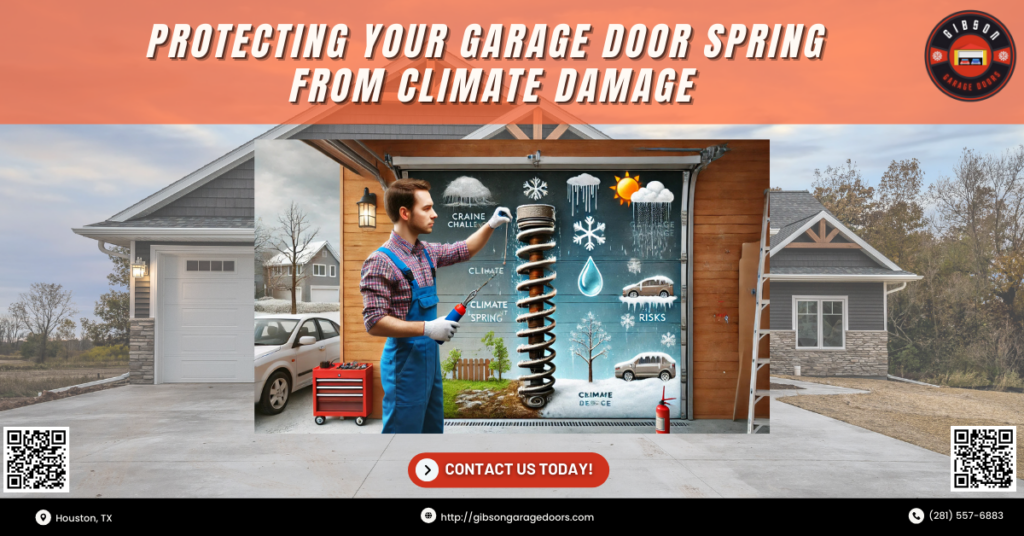Protect your garage door spring from Houston’s climate! Learn how heat, cold, and humidity impact springs and get expert garage door repair from Gibson Garage Doors.

How Climate Affects Garage Door Spring Longevity
Your garage door is one of the most essential parts of your home or business, providing security, convenience, and curb appeal. But have you ever thought about how climate impacts its durability? Houston, TX, is known for its fluctuating weather conditions, from scorching summer heat to high humidity levels and sudden cold snaps. These environmental factors can take a significant toll on your garage door springs, leading to premature wear and costly garage door repairs if not properly maintained.
Garage door springs are critical to the door’s overall functionality, helping to balance its weight and allowing it to open and close smoothly. Extreme temperatures and humidity fluctuations can accelerate wear and tear, leading to potential malfunctions that require professional intervention.
In this blog, we’ll explore the effects of climate on garage door springs, practical tips to protect them, and signs that indicate you may need professional services such as garage door replacement, garage door spring repair, or residential garage door repair. By understanding these factors, you can take proactive measures to extend the lifespan of your garage door system.
The Impact of Extreme Temperatures on Garage Door Springs
Heat’s Effect on Garage Door Springs
Living in Houston, TX, means dealing with intense heat for much of the year. High temperatures can weaken the metal in your garage door springs over time, causing them to lose tension and efficiency. As the metal expands and contracts with temperature fluctuations, the springs may become brittle and prone to breakage.
Some common issues caused by extreme heat include:
- Loss of elasticity: Over time, constant exposure to heat can weaken the springs, making them less effective in balancing the door’s weight.
- Increased likelihood of spring failure: The added stress from weakened springs can lead to unexpected breakdowns.
- Difficulty in opening and closing the garage door: A weakened spring means the door may not open or close smoothly, leading to additional strain on the garage door opener.
- Added wear on other components: A failing spring can put excessive pressure on the opener and other parts, increasing the risk of needing garage door opener repair.
Cold Weather and Your Garage Door Springs
While Houston doesn’t experience prolonged freezing temperatures, occasional cold spells can cause the metal springs to contract and become brittle. This contraction can lead to several issues, including:
- Sudden spring breakage: Cold temperatures can make springs more brittle, increasing the chances of them snapping without warning.
- Noisy garage door operation: A spring under stress due to contraction may cause creaking and popping sounds.
- Reduced operational efficiency: Stiffened springs can struggle to provide the necessary counterbalance, making the door difficult to operate.
- Increased need for emergency repairs: A broken spring during a cold spell can render the garage door inoperable, necessitating emergency garage door repair.
How Humidity Affects Garage Door Springs
Houston’s high humidity levels can pose a significant threat to the longevity of your garage door springs. When moisture in the air comes into contact with the metal components, it can lead to rust and corrosion, which severely compromise the springs’ strength and functionality.
Some effects of humidity on garage door springs include:
- Rust formation: Rust buildup weakens the coils, making them more prone to snapping under stress.
- Increased friction: A rusty spring may not function smoothly, causing jerky movements and additional strain on the opener.
- Shortened lifespan: Springs exposed to consistent moisture without proper maintenance will require premature replacement.
To combat these effects, it’s crucial to take preventative measures and ensure regular upkeep of your garage door system.
Protecting Your Garage Door Springs from Climate Damage
Routine Maintenance Tips
Regular maintenance is the best way to extend the life of your garage door springs and avoid costly repairs. Here are some essential tips to keep them in top shape:
- Lubrication: Apply a high-quality silicone or lithium-based lubricant to the springs every few months to prevent rust and friction.
- Inspection: Regularly check for signs of wear, rust, or damage to catch issues early and address them before they escalate.
- Balance Test: Perform a balance test by manually lifting the garage door halfway. If it doesn’t stay in place, the springs may need adjustment or replacement.
- Professional Tune-Ups: Schedule routine check-ups with experts specializing in garage door repair in Houston, TX, to ensure your system remains in optimal condition.
Climate-Proof Your Garage
Another effective way to protect your garage door springs from climate-related damage is by controlling the environment inside your garage. Consider implementing the following strategies:
- Install insulation: Insulating your garage door helps regulate temperature fluctuations, reducing stress on the springs.
- Use a dehumidifier: A dehumidifier can help reduce excess moisture in the garage, preventing rust and corrosion.
- Ensure proper ventilation: Good airflow can help control humidity levels and prevent condensation buildup.
- Apply weather stripping: Sealing gaps around the garage door prevents moisture from seeping in and affecting metal components.
FAQ: Answering Your Garage Door Spring Questions
Q: How often should I replace my garage door springs?
A: On average, garage door springs last 7-9 years with regular use, but extreme climate conditions can shorten their lifespan. Regular maintenance can help extend their longevity.
Q: What should I do if my garage door spring breaks suddenly?
A: Immediately stop using the door and call for emergency garage door repair to prevent further damage and safety risks.
Q: Can I repair garage door springs myself?
A: It’s not recommended. Garage door spring repair is complex and dangerous; always rely on professionals to handle repairs safely and effectively.
Conclusion
Your garage door springs play a crucial role in keeping your garage door functioning smoothly. Houston’s climate poses unique challenges, but with the right maintenance and preventive measures, you can extend the life of your springs and avoid costly repairs. Whether you need garage door installation, commercial garage door repair, or help with your garage door opener repair, Gibson Garage Doors is here to provide expert service.
If you’re experiencing issues or want to schedule a maintenance check, contact Gibson Garage Doors today. We proudly serve Houston, TX, including neighborhoods near the Houston Zoo, Minute Maid Park, and The Galleria.
Don’t let climate damage your garage door – schedule your free inspection today and protect your investment! Click Here.
